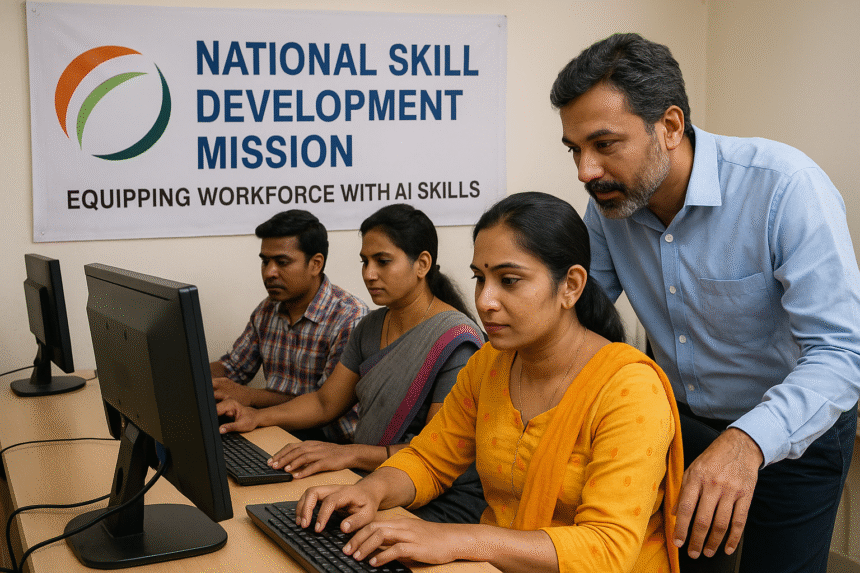Empowering India’s Workforce for an AI-Driven Future
Key Highlights:
- Government expands the National Skill Development Mission with a ₹3,000 crore allocation for AI-focused skill development.
- Target to train 2 million individuals in AI and related technologies by 2030.
- Focus on AI certifications, hands-on projects, and industry internships.
- Special emphasis on upskilling rural and underprivileged youth for equitable opportunities.
- Partnerships with IITs, NITs, and global tech giants for curriculum design and execution.
The Story
In a bid to future-proof its workforce, the Indian government has announced the inclusion of Artificial Intelligence (AI) in the National Skill Development Mission. With an investment of ₹3,000 crore, this initiative is set to empower millions with in-demand AI skills, preparing them for the global job market while fostering innovation and self-reliance.
Union Minister Dharmendra Pradhan, speaking at the program’s launch, stated, “The integration of AI into the National Skill Development Mission is not just about jobs; it is about preparing India for leadership in the global digital economy.”
This ambitious initiative recognizes the transformative role AI will play across industries, from healthcare to finance, and aims to create a tech-savvy workforce capable of driving India’s AI revolution.
Strategic Focus Areas
The government’s expanded mission focuses on equipping individuals with a range of AI-related skills through targeted initiatives:
- AI Certifications: Courses on AI fundamentals, machine learning, and data analytics offered through online and offline platforms.
- Practical Training: Hands-on projects and hackathons to provide real-world problem-solving experience.
- Industry Internships: Partnerships with leading companies to offer internships in AI development and deployment.
- Rural Upskilling: Special programs designed to upskill rural and economically disadvantaged youth, ensuring inclusivity.
- AI Entrepreneurship: Workshops and funding support for aspiring entrepreneurs in the AI space.
Budget Allocation and Goals
The ₹3,000 crore investment will be distributed as follows:
- ₹1,000 crore for AI certifications and skill development programs.
- ₹800 crore for infrastructure to establish AI learning hubs in rural and semi-urban areas.
- ₹700 crore for partnerships with private sector companies and global tech leaders.
- ₹300 crore for scholarships and stipends to economically disadvantaged participants.
- ₹200 crore for promoting AI innovation through national-level competitions and hackathons.
Impact in Numbers
- 2 million individuals to be trained in AI skills by 2030.
- Establishment of 25 regional AI training centers across the country.
- Training of 10,000 trainers to deliver AI courses at the grassroots level.
- Development of 50 AI-driven startups through entrepreneurial support programs.
Challenges and Solutions
Despite its potential, the mission faces challenges, including:
- Awareness Gap: Many individuals, particularly in rural areas, remain unaware of AI’s career opportunities.
- Resource Constraints: High costs of AI tools and infrastructure could limit accessibility.
- Digital Divide: Limited internet access in certain regions might hinder online training.
To address these challenges, the government plans to:
- Launch awareness campaigns to highlight AI’s scope and opportunities.
- Provide subsidies for AI training programs and tools in underprivileged regions.
- Invest in expanding digital infrastructure to enable broader access to online courses.
Conclusion
The integration of AI into the National Skill Development Mission signifies a forward-looking approach to workforce development. By equipping individuals with cutting-edge AI skills, the government aims to empower them to thrive in a rapidly evolving job market while driving the nation’s technological advancement.
While challenges such as awareness gaps and infrastructure limitations persist, the initiative’s inclusive design and robust funding provide a strong foundation for success. As India embraces the AI revolution, this mission stands as a beacon of opportunity, preparing its workforce to lead in the global digital economy.


Leave a Reply